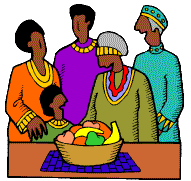Vol. 3, No. 1 • Fall 1998
Parent to Parent: Saying Good-bye
by Karon LashawQuestion: We have a 5-year-old who has been in foster care in our home for over a year. If things continue according to the current plan, she will be reunited with her birth family within the next two months. We are not sure how to say good-bye. Can you give any suggestions?
Response: Saying good-bye is one of the hardest things a foster parent or foster family can ever have to say. But, it also signifies one of the happiest events in the foster care system--a family being reunited. So, congratulations on a job well done!
Over the course of the next several weeks the child will transition out of your home and back into her birth family's home. You will need to assure and reassure your child that this change is okay, even great.
As the time approaches for the final transition you might consider having a small celebration for your child. Invite the birth family. Celebrate their joy at getting their child back. Share your love.
When the day finally does come, don't be afraid to cry. There may be some tears of sadness, but there will also be tears of joy for the child. Remember that every child wants to live with her mom and dad. Saying good-bye is never easy, and it shouldn't be.
Perhaps the Cherokee Indians know the best way to put this transition into words. In the Cherokee language there is no word for "good-bye"; instead, there is
(pronounced Do-nv-da-go-hv-i), meaning "until we meet again."
There simply is no easy way to say good-bye. So much depends on your family, the child, the community, and many other factors. The child's age is an important element to consider. A very young child (under three) is not likely to understand what is happening. Older children may know exactly what is taking place and want to know all the details.
Has the child been a part of your family for one, two, or three months? More than a year? Are there other children in your family? What relationship do they have with your foster child? Sometimes the child is going back to his or her family. Other times the child is moving into a different foster home, an adoptive family, a group home, or independent living. Does the child want to continue to have a relationship with your family? Does the birth family want the child to have a relationship with your family? Has the child been reunited in the past, just to be placed back into foster care?
As you consider these and other questions and prepare to go through the good-bye process remember that each foster family is unique and each foster child is unique.
Remembering to keep the best interest of the child in ;your mind and heart is probably the best way to determine how to say good-bye. Sometimes, silence and a hug are the best answer.
Karon Lashaw lives in Alamance County, North Carolina.
Copyright � 2000 Jordan Institute for Families

